Profession DefinitionA profession is a type of career or occupation that requires specialized education, training, and knowledge in a particular field. Professionals typically have a set of ethical and technical standards they are expected to follow and maintain throughout their careers. Examples of professions include doctors, lawyers, engineers, accountants, architects, teachers, and others. Professions often require a license or certification to practice legally and are typically regulated by a professional association or governing body. 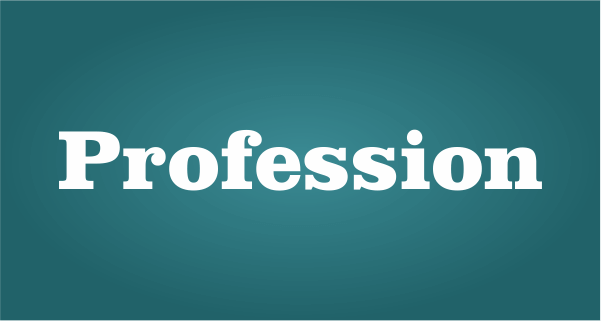 History and Development of ProfessionsThe concept of professions dates back to the medieval period when individuals with specialized skills and knowledge were organized into guilds. These guilds were in charge of establishing requirements for their particular professions and ensuring members followed those requirements. Guilds were typically exclusive, and membership was restricted to those who had completed an apprenticeship and demonstrated proficiency in their chosen trade.  Over time the concept of professions evolved, and new fields that required specialized education and training emerged. In the 19th century, industrialization led to the development of new professions, such as engineering and accounting, which required specialized knowledge and expertise. These new professions were often associated with the middle class, and practitioners were expected to adhere to professional standards. The 20th century saw further development in the concept of professions with the emergence of fields such as medicine, law, and education. These professions required a high level of education and training, and practitioners were often required to obtain a license or certification to practice legally. The rise of professional associations and governing bodies helped regulate these fields, ensuring practitioners adhered to ethical and technical standards. Significance of Professions in Contemporary SocietyProfessions play a crucial role in contemporary society, as they are essential for various sectors, including healthcare, law, education, engineering, and many others. The following are some of the significant contributions that professions make to modern society: Meeting the Needs of SocietyProfessions exist to meet the requirements of society. Healthcare professionals, for example, provide medical care to individuals, while engineers design and build the infrastructure that supports modern life. Lawyers help to enforce laws, while educators prepare individuals for successful careers and active citizenship. Many societal needs would go unmet without these professions, leading to a breakdown in the social order. 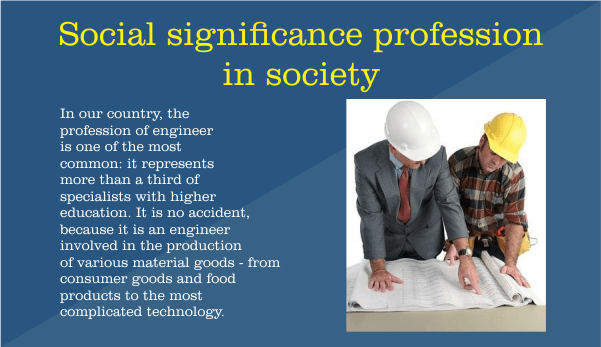 Ensuring Quality StandardsProfessions are held to high standards of quality and accountability. Professionals must adhere to strict ethical codes and are often subject to regulation and oversight by governing bodies. This guarantees that experts deliver high-quality services and goods that satisfy society's demands. Promoting InnovationMany professions are responsible for driving innovation and technological advancement. Engineers, for example, are often at the forefront of technological development, designing new systems and machines that improve the efficiency and effectiveness of various industries. Similarly, healthcare professionals continually advance medical research and develop new treatments for various illnesses and diseases. Creating JobsMany professions create jobs and contribute to the economy. For example, the healthcare industry employs millions worldwide, from doctors and nurses to medical researchers and pharmaceutical professionals. Professions in the education sector, such as teachers and professors, also create jobs and contribute to the development of future generations. Fostering Social MobilityProfessions provide opportunities for social mobility, enabling individuals to move up the socioeconomic ladder based on their skills and qualifications rather than their background or social status. This is especially true for professions such as medicine and law, which typically require advanced degrees and specialized training. Professions help create a more just and equal society by facilitating social mobility. Contributing to Public GoodProfessions are often involved in activities that benefit the public good. For example, healthcare professionals provide medical care to those in need, while lawyers work to uphold justice and protect individual rights. Engineers design and build infrastructure that supports communities while educators prepare individuals for active citizenship and leadership roles. Types of ProfessionsThere are numerous types of professions, each requiring different levels of education, training, and specialized knowledge. Here are some examples of different types of professions:
ProfessionalismProfessionalism refers to the behavior, values, and attitudes expected of professionals. Professionalism involves a commitment to ethical behavior, accountability, and high-quality work. Here are some of the key characteristics of professionalism:
Challenges Facing ProfessionsDespite the numerous benefits of professions, they face several challenges in contemporary society. Here are some of the key challenges:
RegulationAny profession's self-regulation began with organizations like the School of Physicians or the Motels of Court. Legal organizations have gradually taken on the growing role of government, choosing its employees either via the profession or (more recently) through the public authority. A profession may request proposals to present or enhance legal guidelines to protect its clients, enhance its reputation, or restrict admission to the profession to enable greater fees to be assessed. It may be viewed as limiting people's opportunities to develop or practice in the ways that, in their professional opinion, they believe to be most effective. 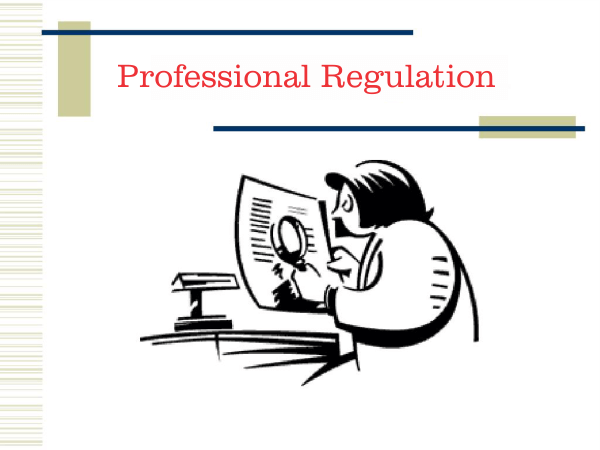 When the English government developed broad legislative guidelines for therapists in 2008, that served as a model. Many problems in psychotherapy served as the impetus for the change. Still, there are many different types of doctors, including those with no therapeutic responsibilities, and the justification for the new guidelines was not quite evident. Conflict arose from work brain research, with the English Mental Society favoring the legal definition of "word-related analysts" and the Relationship of Business Clinicians opposing the legal definition of "business therapists" - representations of professional movements that may not be difficult to recognize. Professional bodies may set competency standards, enforce adherence to a moral code, and regulate admission to a profession. The bookkeeping organizations of the Unified Realm (ACCA, CAI, CIMA, CIPFA, ICAEW, and ICAS), which have all received a Regal Sanction even though their members are not necessarily thought to possess the same qualifications and collaborate with other organizations, serve as an example (AAPA, IFA, CPAA). The Hong Kong Professional Educators Association, which regulates the rights, duties, and freedoms of paid teachers employed by educational institutions in Hong Kong, is another example of an administrative body that regulates a profession. In certain nations (Canada and the USA), engineering practice is strictly controlled through a rigid licensing system for Professional Engineers, but not in others (the UK), where Chartered Engineer titles and degrees are regulated, but the practice is unregulated. Ordinarily, a person must first be certified as competent by a regional professional body to practice a profession. Yet, it may not be permitted for someone to hold a certification from such a professional organization in other countries, such as those where accountancy is practiced, like the United Kingdom (except for auditing and insolvency work which legally require qualification by a professional body). Although most employers and clients need an individual to acquire these degrees before using their services, professional certification by professional bodies is still regarded as a precondition to operate in such circumstances. To work as a fully recognized teaching professional at a state or government-funded school, one must complete a Postgraduate Diploma in Education (PGDE) or a Bachelor of Education (BEd) at an approved university or higher educational institution in Hong Kong. The Hong Kong Educational Department Bureau, the governmental body overseeing the city's educational system, established this requirement. AutonomyProfessions will generally be independent, which implies they have a serious level of control of their undertakings: "professionals are independent to the extent that they can make autonomous decisions about their work". This normally signifies "the opportunity to practice their professional judgment." But it also means other things. "Professional autonomy is sometimes characterized as a claim of professionals who must prioritize serving their interests... Only if members of the profession subject their actions and judgments to peer review by other professionals can this professional autonomy be maintained. Because of this, it is possible to interpret the concept of autonomy as embracing not only judgment but also self-interest and a continuous process of critical review of ethics and procedures from inside the profession itself. 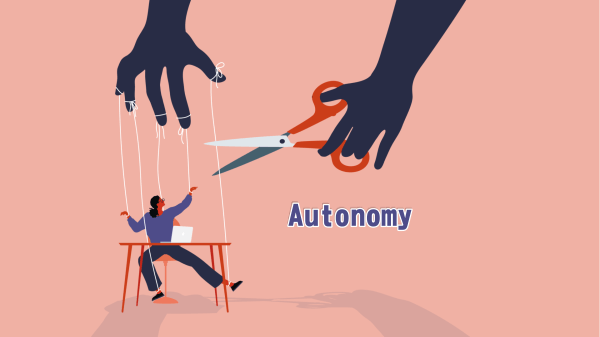 The historical prohibition on the corporate practice of the professions, particularly accounting, architecture, medicine, and law, is a significant consequence of professional autonomy. This implies that these experts cannot acquire money quickly in many countries through initial public offerings or flotations or do business through typical for-profit organizations. Instead, they must create unique business entities like partnerships or professional corporations if they want to practice together. These entities have two key characteristics: (1) reduced protection from liability for professional negligence; and (2) strict restrictions or outright bans on ownership by non-professionals. This has the obvious effect of requiring all equity shareholders of the professional business entity to be also professionals. This safeguards professional autonomy by removing the chance that the company's non-professional owner may direct a professional in performing their duties. According to this theory, the customer is the only non-professional with any business directing a professional what to do; in other words, professional autonomy protects the mutually beneficial two-way connection between a professional and a client. The profession demands that professionals exercise their autonomy above this client-professional relationship to uphold the standards of ethics that the profession needs. Yet, professional business entities develop more slowly than public corporations since they are excluded from the stock market. CharacteristicsAbout defining the distinctive characteristics of a vocation, there is amazing comprehension. They possess a "professional affiliation, mental foundation, regulated preparation, permitting, work independence, partner control... (further) set of principles," to which Larson later also adds "elevated expectations of professional and scholarly greatness" that "professions are occupations with exceptional power and esteem," and that they contain "a selective first-class bunch" in all social orders. They have also been described as "laborers whose characteristics of separation, independence, and gathering devotion are greater than those found among other groups...their credits include a serious level of orderly information, solid local area direction and dedication, self-guideline, and an arrangement of remunerations characterized and controlled by the local area of laborers." 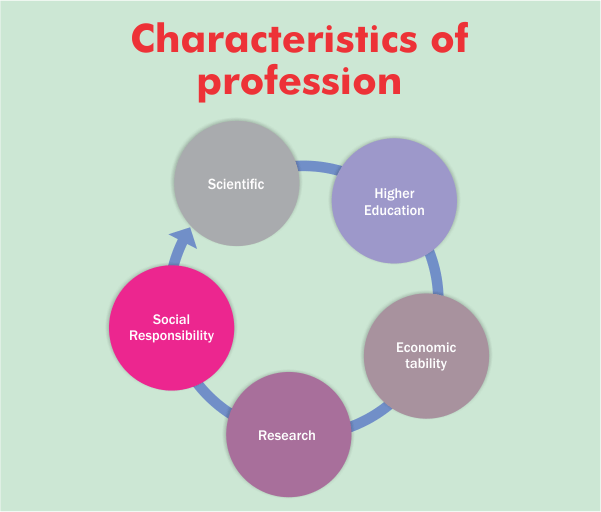 Another definition of a profession is "an extraordinary kind of occupation... possessing corporate solidarity... prolonged specific preparation in a group of unique information, and a collectivity or administration orientation... a professional sub-culture which contains understood codes of conduct, creates an esprit de corps among people from a similar profession, and ensures them certain word-related advantages... (also) regulatory designs and monocultures." A fundamental characteristic of a profession is the requirement to develop and exercise professional tact or the ability to provide defense using case choices rather than ones firmly established by a rule or instruction. Next TopicPure Substance Definition |